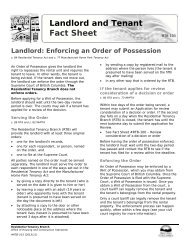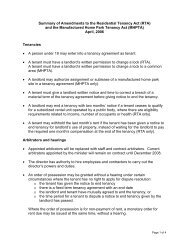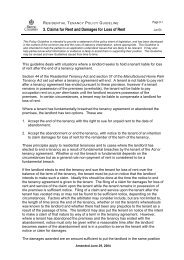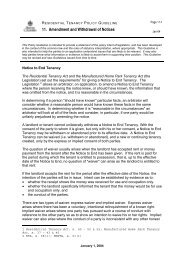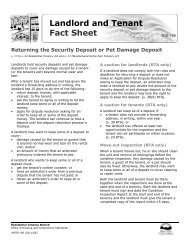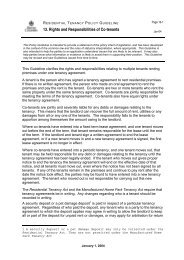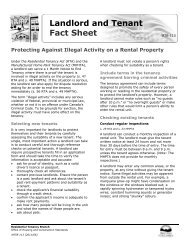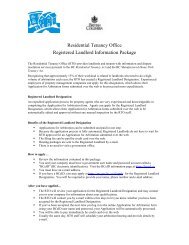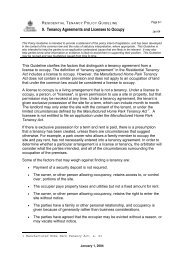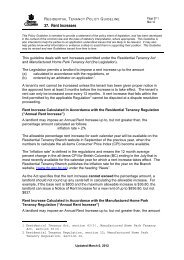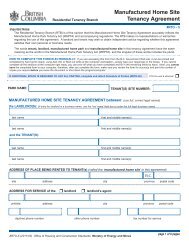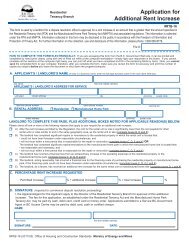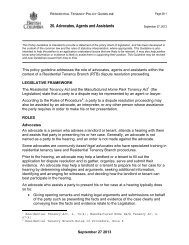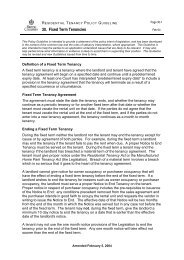Claims in Damages - Residential Tenancy Office
Claims in Damages - Residential Tenancy Office
Claims in Damages - Residential Tenancy Office
Create successful ePaper yourself
Turn your PDF publications into a flip-book with our unique Google optimized e-Paper software.
RESIDENTIAL TENANCY POLICY GUIDELINE Page 16-2<br />
16. <strong>Claims</strong> <strong>in</strong> <strong>Damages</strong> Jan-04<br />
years from the date on which the right arose, whether based on contract, tort or statutory<br />
duty.<br />
The Limitation Act provides that the right to br<strong>in</strong>g an action for most other claims,<br />
<strong>in</strong>clud<strong>in</strong>g claims <strong>in</strong> debt, ends at six years from the date on which the right arose. A<br />
person who owes a debt may, under certa<strong>in</strong> circumstances, be found to have confirmed<br />
that debt such that the limitation period for fil<strong>in</strong>g a claim <strong>in</strong> respect of that debt is<br />
extended.<br />
The Ultimate Limitation Period under the Legislation<br />
The <strong>Residential</strong> <strong>Tenancy</strong> Act and the Manufactured Home Park <strong>Tenancy</strong> Act provide that<br />
if these Acts do not state a time by which an application for arbitration must be filed, it<br />
must be filed with<strong>in</strong> 2 years of the date that the tenancy to which the matter relates ends<br />
or is assigned .3<br />
The same sections of the Legislation provide that despite the Limitation Act, if an<br />
application for arbitration is not filed with<strong>in</strong> the 2 year period, a claim aris<strong>in</strong>g under these<br />
Acts or the tenancy agreement <strong>in</strong> relation to the tenancy ceases to exist for all purposes.<br />
However, <strong>in</strong> the event that one party files for arbitration with<strong>in</strong> the limitation period and the<br />
other party has a claim which was not yet filed and which is barred by the limitation period<br />
that party may file an application for arbitration so long as it is filed before the first<br />
application is heard .4 This exception does not apply to a limitation established under the<br />
Limitation Act, however that Act has its own provisions for counterclaims.<br />
<strong>Claims</strong> <strong>in</strong> Tort<br />
A tort is a personal wrong caused either <strong>in</strong>tentionally or un<strong>in</strong>tentionally. An arbitrator may<br />
hear a claim <strong>in</strong> tort as long as it arises from a failure or obligation under the Legislationor<br />
the tenancy agreement. Failure to comply with the Legislation does not automatically<br />
give rise to a claim <strong>in</strong> tort. The Supreme Court of Canada decided that where there is a<br />
breach of a statutory duty, claims must be made under the law of negligence. In all cases<br />
the applicant must show that the respondent breached the care owed to him or her and<br />
that the loss claimed was a foreseeable result of the wrong.<br />
An arbitrator may also hear a claim where there has been a breach of the common law of<br />
landlord and tenant. These are evolv<strong>in</strong>g legal pr<strong>in</strong>ciples set out by court decisions and<br />
may, or may not, be recorded <strong>in</strong> a tenancy agreement or set out <strong>in</strong> the Legislation.<br />
<strong>Claims</strong> for Breach of Contract<br />
Prior to mak<strong>in</strong>g a claim for breach of the tenancy agreement, the Legislation permits<br />
either the landlord or the tenant to apply for arbitration for an order that the other party<br />
comply with the tenancy agreement or the Act .5 that governs the agreement.<br />
The purpose of damages is to put the person who suffered the loss <strong>in</strong> the same position<br />
as if the contract had been carried out. It is up to the person claim<strong>in</strong>g to prove that the<br />
3 RTA s. 60; MHPTA s. 53 (3)<br />
4 RTA s. 60; MHPTA s. 53 (3)<br />
5 RTA s. 55 and s. 58; MHPTA s.55 and s. 58 <br />
January 1, 2004



